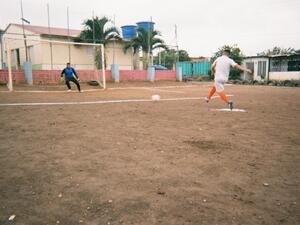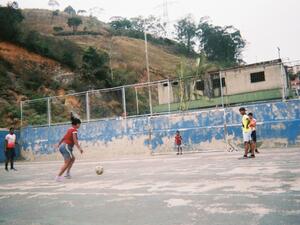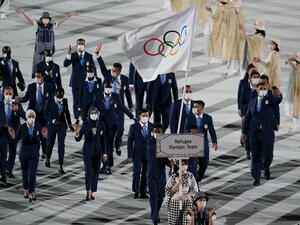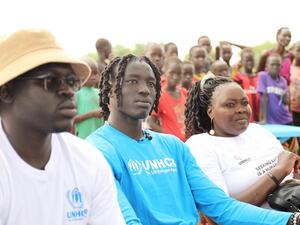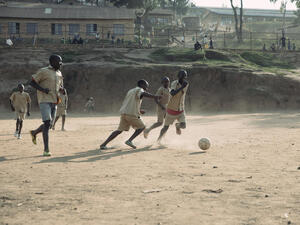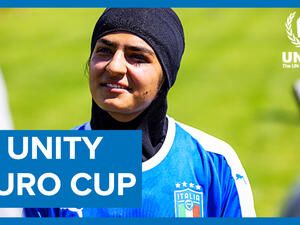Iranian asylum-seeker in Hungary uses sport to heal body and soul
Iranian asylum-seeker in Hungary uses sport to heal body and soul

Najib comes to the gym in the state-run reception centre in Hungary every day, finding therapy in practicing sports and helping fellow asylum-seekers.
VAMOSSZABADI, Hungary, March 30 (UNHCR) - Najib,* a tall, muscular man, sits in the small gym where he exercises, telling a horrifying tale of arbitary punishment against his wife in the Islamic Republic of Iran. Only his passion for sports, he says, allows him to conquer the pain and be strong in exile for his wife and six-year-old son.
"I usually have a good cry when I go for a run in the morning," confesses Najib. "That's when the shock of the last months finds its way out of my soul. By the time I get back, I've already found my inner peace, so I can smile at my son and wife and start the day."
The gym where he works out is located in the government-run reception centre at Vamosszabadi in western Hungary which has been home for Najib and his family for the past two months. Najib, who formerly sold plastic for the construction industry, made the decision to flee Iran last September after the feared Iranian morality police arrested his wife for not wearing her hijab, or headscarf, properly. Alish* faced flogging, imprisonment and a huge fine.
During four days in jail, "they beat her up badly," Najib says in a low voice. He suspects that Alish - who apologizes but says she does not have the strength to talk to visitors - actually suffered something much worse.
"I don't know what else they did to her while she was locked up," Najib adds. "She does not want to tell me more. But Alish is destroyed: she hardly eats or sleeps and she won't talk to people. I do my best to heal her wounds, but we'll need professional help."
Until that comes, Najib relieves his own stress with a workout in the reception centre's well-quipped gym. His passion for sports also led him to become a volunteer coach for fellow asylum-seekers at the understaffed state institution. So far 10 of the 160 asylum-seekers - who live here while waiting for their cases to be processed - use the gym.
"If people can't keep themselves busy, they get bored and nervous," he says. "That's why I tell the newly arrived to use the gym. I show them how to use the machines, so they don't get injured" or damage the equipment.
Najib has been a sportsman all his life, a master of aikido - the Japanese martial art -- as well as an enthusiastic jogger and weightlifter. Sport gave him discipline and endurance, he says; but no training could have prepared him for the shock of his wife's sudden disappearance.
When Alish did not return to their Tehran apartment one evening last August, Najib started to fear the worst. He called every hospital but could not get any news. "My boy was crying and I was desperate and clueless," he recalls.
After two sleepless nights, a friend suggested that Alish might have been arrested by the Basij, Iran's morality police force that enforces wearing of the hijab and and other religious edicts. Najib managed to secure her release, but she was in terrible shape. A lawyer warned that she was likely to face charges of blasphemy and a possible heavy sentence if convicted.
"From that moment on I could only think of how to escape this nightmare," Najib says. "As a husband and a father, I live to take care of my loved ones." The decision to leave his homeland became a relatively easy one - even when it meant turning to a human smuggler.
The smuggler organized the family's trip to Europe through Turkey and chose Hungary as their destination. Najib admits they knew nothing about the country where they might have to start a new life if they are granted asylum.
"Although we had arrived without a proper invitation, so far everyone was nice to us here." Looking around the gym, he adds: "If I can learn the language we will manage somehow. I could be a fitness coach for example."
He says he has something special to offer: "You know, sports can heal both your body and your soul. If it helps me, it might help others here who have suffered more and gone through horrible things in Syria or Africa. Those who come to work out with me get a bit of extra energy that can help to keep them going."
* Names changed for protection reasons
By Balint Linder in Vamosszabadi, Hungary

